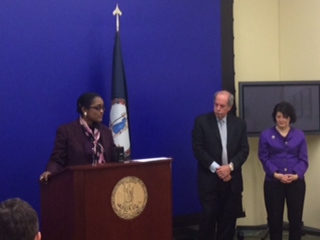AARP Hearing Center

NEW LAW WILL HELP CAREGIVERS LEARN HOW TO CARE FOR FAMILY MEMBERS AFTER HOSPITAL DISCHARGE
RICHMOND_ AARP members and family caregivers descended upon the Virginia General Assembly in January to urge lawmakers to pass a bill to help people who care for family members at home. Three weeks later their wish was granted with both the House of Delegates and Senate passed legislation known as the CARE Act.
Governor Terry McAuliffe must sign the legislation into law for it to take effect. If he does so, the new law will go into effect after the Virginia Department of Health makes new rules for hospitals later this year.
“We caregivers exist in a secret society that you can only understand by living it,” said Pamela Bingham of Petersburg at a January press conference held to highlight the problems family caregivers face.
More than 100 people came to the Capitol from across the state to advocate for the more than 1.7 million family members who care for their loved ones at home.
Virginia’s 1.7 million family caregivers provide care to their loved ones that equals $11.7 billion if those family members were in a care facility, according to a 2011 AARP study. Those caregivers often have to perform medical or nursing tasks for which they aren’t trained.
“AARP is fighting to help people live independently as long as possible, and for the family caregivers who help them to stay in their homes,” said AARP Virginia President Bob Blancato. “By simply providing training and support for caregivers, we can help seniors to stay at home where they want to be, and prevent unnecessary hospitalizations.”
Bingham cares for her mother at home and cared for her father for several years until his death last fall.
“Families are really on their own when a family member becomes ill,” she said. “I have often felt inadequate in Dad's caregiving post hospitalizations.”
House Bill 1413 and Senate Bill 851 require hospitals to notify family caregivers when their loved one is being discharged from the hospital and provide instruction on how to do the required medical tasks at home.
“Family caregivers are the unsung heroes who make it possible for their loved ones to live independently,” Blancato said.
Bingham summed up the feelings of many caregivers: “I feel so alone so many times in this experience. We need more help.”
AARP is a nonprofit, nonpartisan organization, with a membership of nearly 38 million, that helps people turn their goals and dreams into real possibilities, strengthens communities and fights for the issues that matter most to families such as healthcare, employment and income security, retirement planning, affordable utilities and protection from financial abuse. We advocate for individuals in the marketplace by selecting products and services of high quality and value to carry the AARP name as well as help our members obtain discounts on a wide range of products, travel, and services. A trusted source for lifestyle tips, news and educational information, AARP produces AARP The Magazine, the world's largest circulation magazine; AARP Bulletin; www.aarp.org; AARP TV & Radio; AARP Books; and AARP en Español, a Spanish-language website addressing the interests and needs of Hispanics. AARP does not endorse candidates for public office or make contributions to political campaigns or candidates. The AARP Foundation is an affiliated charity that provides security, protection, and empowerment to older persons in need with support from thousands of volunteers, donors, and sponsors. AARP has staffed offices in all 50 states, the District of Columbia, Puerto Rico, and the U.S. Virgin Islands. Learn more at www.aarp.org.































































